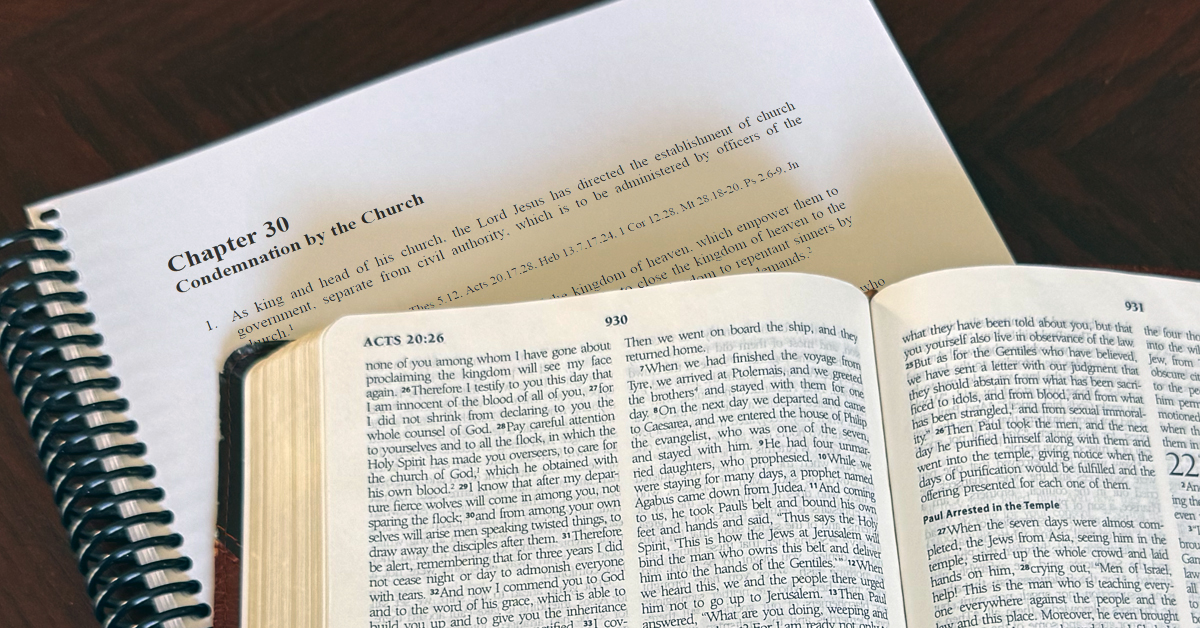By Paul Bammel
TE, Presbytery of the East
Church health and vitality are essential to a congregation’s witness to the gospel. Recognizing this, the Evangelical Presbyterian Church (EPC) developed the Church Health Process to strengthen congregations for faithful and effective ministry. This initiative reflects a sincere desire to promote leadership renewal and strategic clarity.
However, a key flaw in the process threatens to undermine biblical church governance: the delegation of spiritual discernment to Vision and Prayer Teams. While intended to foster broad participation, this model shifts spiritual authority from the Session to ad hoc committees, weakening the elders’ biblical role as shepherds of the church. Scripture and the Westminster Confession of Faith make clear that Teaching and Ruling Elders are entrusted with overseeing doctrine, guarding the flock, and discerning the mind of Christ for the congregation. Delegating this task to separate teams risks diminishing both the biblical and confessional authority of the Session.
This article argues that the responsibility for discerning God’s vision must remain with the ordained elders, who have been called, trained, and set apart to lead the church in faithfulness to Christ. Outside resources and congregational engagement can support this process, but they must not replace the Session’s role as the church’s spiritual overseers. A truly healthy church is one where elders, not separate committees, lead the process of discerning God’s vision — as Scripture and the Westminster Confession prescribe.
Biblical and Confessional Foundations for Elder-Led Leadership
A. Biblical Foundations
The Session holds a biblically mandated role as the spiritual overseers of the church. Its responsibility includes shepherding the congregation, safeguarding doctrine, and discerning the mind of Christ for the church’s life and ministry.
Scripture consistently affirms the role of elders as those entrusted with spiritual oversight. In Acts 20:28, Paul exhorts the elders in Ephesus, saying, “Pay careful attention to yourselves and to all the flock, in which the Holy Spirit has made you overseers, to care for the church of God.”
Similarly, 1 Peter 5:1-3 urges elders to shepherd God’s flock not as passive facilitators but as accountable leaders, guiding the church with humility and wisdom. Hebrews 13:17 reinforces this responsibility, saying, “Obey your leaders and submit to them, for they are keeping watch over your souls, as those who will have to give an account.”
These passages make it clear that spiritual discernment is not a function to be delegated; it is a sacred charge given to elders. Vision-setting is not merely an administrative exercise — it is a theological responsibility tied to sound doctrine, wisdom, and accountability before God (Titus 1:7-9, James 3:1). If the task of discerning direction is removed from the Session’s oversight, the church risks making decisions driven by pragmatism rather than by biblical fidelity. The EPC must ensure that its discernment process remains under the leadership of those called and ordained to shepherd the flock.
B. Confessional Foundations
The Westminster Confession of Faith (WCF) further affirms that church governance has been divinely established and entrusted to elders: “The Lord Jesus has directed the establishment of church government, separate from civil authority, which is to be administered by officers of the church” (WCF 30.1). And, “To these officers are committed the keys of the kingdom of heaven” (WCF 30.2). For these references, see page 58 of the PDF linked above.
In addition, Chapter 31 of the Confession describes the authority of ecclesiastical assemblies, which includes Sessions, to determine matters of doctrine, worship, and church government:
“As far as the ministry is concerned, it is the responsibility of synods and councils to settle controversies of faith and cases relating to matters of conscience, to set down rules and directions for the better administration of the public worship of God and of church government, and to hear complaints in cases of maladministration and authoritatively to settle them. If these decisions conform to the word of God, they are to be accepted reverently and submissively, not only because they agree with the word but also because they rest on authority ordained and arranged by God in his word” (WCF 31.2).
This statement underscores that spiritual oversight belongs to elders gathered in ecclesiastical assemblies, not to committees without ordained authority. Delegating vision-setting to Vision and Prayer Teams introduces a significant risk: it detaches spiritual discernment from those who are theologically trained, ordained, and held accountable for their leadership. Elders are not merely decision-makers; they are shepherds charged with guarding the flock from doctrinal drift (Titus 1:9). If vision-setting becomes disconnected from theological oversight, the church risks prioritizing strategy over Scriptural fidelity.
Preserving Biblical Church Governance and Presbyterian Identity
The EPC must reaffirm that spiritual discernment is not a democratic process but a shepherding responsibility. Congregational engagement is useful, but final authority must remain with the elders, who are uniquely called to this task. Encouraging congregational participation in ministry is both biblical and beneficial, but participation should never be confused with spiritual authority. Rather than delegating the work of vision-setting, the Church Health Process should reinforce the biblical role of the Session. Sessions should be equipped to lead in prayer, biblical discernment, and theological reflection — not bypassed in favor of committees that may lack the same grounding in Scripture and confessional standards. By preserving the elder-led model of governance, the EPC will ensure that churches are not only organizationally effective, but more importantly, spiritually faithful to Christ’s design for His church.
When spiritual discernment is diffused across multiple committees, it creates ambiguity about ultimate authority in decision-making. Who is responsible for setting the church’s direction? If Vision Teams, Prayer Teams, and Implementation Teams all share in this process, the Session’s role as the church’s governing body is weakened. The result is often a fragmented leadership structure where no one bears clear accountability. In contrast, Scripture presents a model of unified, elder-led leadership. The New Testament shows believers exercising their gifts within the body of Christ (1 Corinthians 12:4-7), but final authority for doctrine, discipline, and direction remains with the elders. The church’s vision must remain under the shepherding care of those who have been called, trained, and ordained to lead in faithfulness to Christ. The EPC must be careful to preserve this biblical model rather than unintentionally undermining it.
A truly Presbyterian church is one where leadership is not delegated to ad hoc committees, but one where the Session leads through prayerful, theological reflection and biblical discernment. If the EPC adopts governance models that functionally resemble congregationalism or corporate decision-making, it risks losing the distinct biblical and confessional principles that define its polity. To maintain its theological integrity, the EPC must ensure that:
- The Session remains the primary body for spiritual discernment, rather than delegating this task to Vision or Prayer Teams.
- Outside consultants and resources serve as advisors, not leaders, equipping the Session rather than replacing its role.
- Congregational participation is encouraged but does not override the elder-led model established in Scripture.
By reaffirming these principles, the EPC can strengthen its churches without compromising its biblical and confessional commitment to elder-led governance.
The Church Health Process Should Support Elder-Led Governance
For any church health initiative to be truly effective, it must begin with prayer — not just as a general practice but as a foundational discipline led by the elders of the church. The entire congregation should be encouraged to engage in seasons of fasting and intercession, but the responsibility for spiritual discernment belongs to the Session. The role of prayer in leadership is not passive; it is an essential means by which elders seek God’s direction for His church. The EPC’s Church Health Process currently assigns a Vision Team the responsibility for discerning the church’s life and ministry vision. However, this task properly belongs to the Session. The elders are the biblical and confessional Vision Team, entrusted with shepherding the church and discerning the mind of Christ for its future. While outside coaches and resources can assist in this process, they must function as advisors — not as replacements for elder-led discernment.
To align the Church Health Process with Presbyterian polity, a clear distinction must be made between discernment and implementation:
- The Session must lead the discernment process. The elders, having been called and ordained to shepherd the church, should be the ones to pray, seek Scripture, and determine the church’s vision.
- Outside resources should serve as tools, not leaders. A consultant or church health coach can help facilitate discussions and offer insights, but the final responsibility for discernment must remain with the Session.
- Implementation teams may assist in executing the vision. After the Session has prayerfully determined the church’s direction, a separate Implementation Team can help carry out specific initiatives. However, care must be taken to ensure that it is the Session’s discerned vision being implemented — not an independently developed plan.
By preserving Session-led discernment while allowing for structured implementation, the EPC can strengthen church health without compromising the biblical role of elders. This approach ensures that church governance remains both theologically sound and practically effective.
A Call to Preserve Biblical Governance
Denominational leaders should carefully evaluate the unintended consequences of the current Church Health Process. Adjustments may be necessary to ensure that these initiatives support rather than supplant the biblical role of the Session. Local churches must remain vigilant in upholding the centrality of the Session in discerning the mind of Christ for the congregation. This requires ongoing prayer, theological training, and a commitment to the principles of Presbyterian polity.
The EPC’s Church Health Process represents a sincere effort to equip churches for faithful ministry in challenging times. However, the delegation of discernment to Vision and Prayer Teams risks undermining the biblical and confessional role of the Session. The EPC must reaffirm its commitment to Presbyterian polity by ensuring that Sessions retain their biblical and confessional role.
I urge denominational leaders to reconsider the structure of the Church Health Process, placing elder-led discernment at its center. Likewise, I encourage local Sessions to embrace their calling as shepherds who seek the mind of Christ for their congregations. Church health and vitality depend on faithfulness to the model God has given us. Let us trust that He will bless our obedience, ensuring that our churches remain both spiritually renewed and strategically aligned for ministry. May the EPC continue to prioritize the faithful shepherding of its elders in all matters of church life, ensuring that every congregation is both spiritually vibrant and theologically sound, as God intended.


Leave a Comment